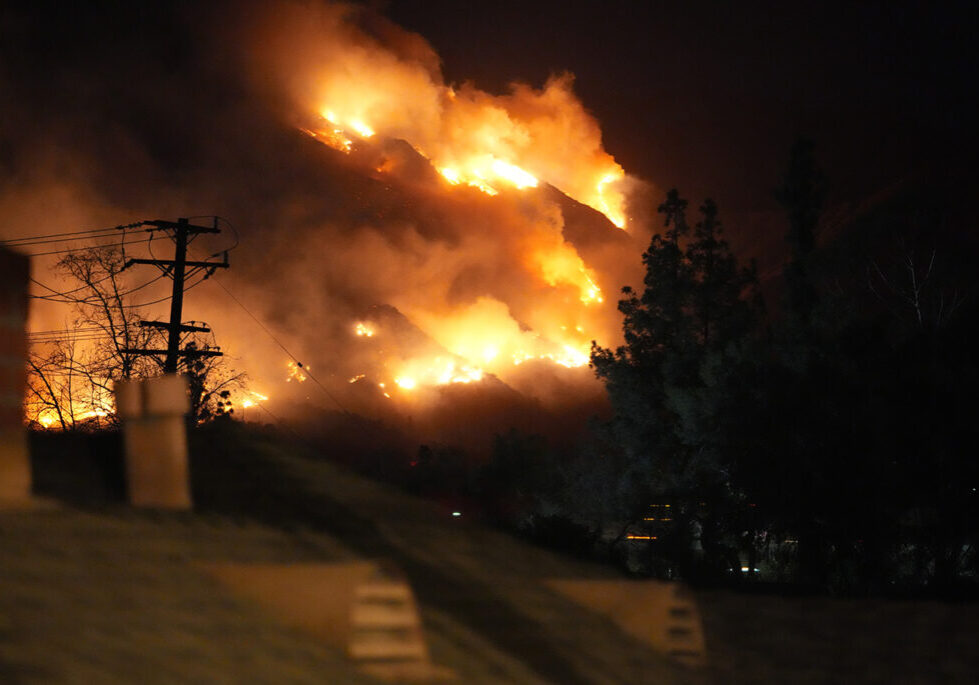The devastating wildfires sweeping through Los Angeles County have left an unprecedented path of destruction in their wake. CBS News reports that 10 days after the first fire broke out on Jan. 7, at least 27 people have lost their lives, more than 12,000 structures have been destroyed, and over 60 square miles have been burned. As our community faces this crisis, many victims are seeking answers about their legal rights and options.
Have you or a loved one been affected by the Los Angeles wildfires?
Eaton Fire
The Eaton Fire, which has burned 14,117 acres and is (as of Jan. 17) 65% contained, has claimed 17 lives and destroyed or damaged more than 7,000 structures in the Altadena and Pasadena areas. Multiple lawsuits have already been filed regarding this devastating blaze.
Pacific Palisades Fire
The Pacific Palisades Fire has burned over 23,000 acres, causing 10 deaths and widespread destruction across Pacific Palisades, Malibu, and neighboring communities. The fire has damaged homes, stores, schools, and landmarks, with recent flare-ups threatening Brentwood and Encino.
Hurst Fire
The Hurst Fire in Sylmar, while smaller at 770 acres, has forced the evacuation of more than 3,000 residents. While now 97% contained, it demonstrates how quickly these fires can threaten communities.
Additionally, two smaller fires — the Auto Fire in Ventura County and the Scout Fire in Riverside County’s Jurupa Valley — are being monitored by fire authorities.
Who’s Liable for the LA Wildfires?
As investigations continue into these devastating fires, questions about liability and legal rights have emerged. The involvement of utility companies has become a central focus, particularly in the Eaton Fire, where multiple lawsuits have already been filed.
In the Pacific Palisades Fire, residents and business owners have filed claims against the Los Angeles Department of Water and Power, alleging that water supply failures from hydrants contributed to the devastation. Meanwhile, the Bureau of Alcohol, Tobacco, Firearms and Explosives (ATF) has deployed its National Response Team to investigate the fire’s cause and spread.
These investigations highlight the complex nature of wildfire liability, where multiple factors — from utility equipment to emergency response systems — may contribute to damages. For residents affected by these fires, understanding your legal rights and options is crucial. Here are answers to the most common questions we’re receiving from fire victims:
Common Legal Questions for Wildfire Victims:
Q: How do I know if I can file a claim for wildfire damages?
A: You may be eligible to file a claim if you have experienced, for example:
- Property damage or destruction
- Physical injuries or health impacts
- Forced evacuation and related expenses
- Business losses or interruption
- Loss of income or wages
- Vehicle or equipment damage
- Loss of loved ones due to the fire
- Smoke damage to property
- Agricultural or livestock losses
The key to any potential claim is documenting your losses and connecting them to the wildfire. Every situation is unique, which is why it’s important to consult with experienced wildfire attorneys who can evaluate your specific circumstances and advise you on your options.
Q: How do I begin the claims process after a wildfire?
A: Important first steps include, but are not limited to:
- Contact your insurance company immediately
- Document all damage with photos and videos
- Create a detailed inventory of damaged property
- Save all receipts for emergency expenses
- File any required reports with local authorities
- Keep records of all communications
- Contact a wildfire attorney to understand your rights
Q: What if my insurance denies my claim or offers too little?
A: If you receive a denial or insufficient offer, you can, for example
- Request the denial or offer in writing
- Ask for a detailed explanation
- Keep all correspondence
- Don’t cash any checks marked as “final payment”
- Don’t sign any releases or waivers
- Consider legal representation to review your case
- Know you have the right to appeal
Q: How long do I have to file a claim?
A: Several deadlines may apply:
- Insurance policies have strict notification requirements
- Property damage claims have specific statutes of limitations
- Claims against government entities often have very short deadlines
- Different types of claims may have different deadlines
- Don’t delay — acting promptly protects your rights
Q: What types of damages can I seek compensation for?
A: In wildfire cases, victims may be eligible to seek compensation for:
- Property damage or destruction
- Personal injury
- Evacuation costs
- Business interruption losses
- Loss of use of property
- Medical expenses
- Emotional distress
- Temporary housing expenses
- Lost wages or income
- Vehicle damage
- Landscaping destruction
- Personal belongings and household items
- Cost of debris removal
Q: What if my insurance coverage isn’t enough to cover all my losses?
A: It’s important to keep in mind, for example:
- You may have additional legal options beyond insurance
- Multiple parties might be held liable
- Class action lawsuits may become available
- Uninsured losses might be recoverable through litigation
Q: What should I do if I suspect utility equipment caused the fire that damaged my property?
A: Currently, investigations are ongoing for several fires. For example, with the Eaton Fire, lawsuits have already been filed alleging utility equipment involvement. Document everything, including, for example:
- Any observations of utility equipment in your area before the fire
- Photographs of damage
- All communication with insurance companies
- Any evidence of electrical anomalies before the fire
Q: What kinds of evidence should I preserve?
A: Important evidence may include:
- Photographs of your property before and after the fire
- All insurance documentation
- Evacuation notices or orders
- Records of all fire-related expenses
- Medical records if you suffered injuries
- Business records if you experienced business losses
- Records of alternative housing costs
Each claim is unique, and the types of damages you can pursue will depend on your specific circumstances and losses. Documenting all forms of loss is crucial for building a strong claim.
Q: What if I was forced to evacuate and abandon my vehicle during a wildfire?
A: If emergency conditions or personnel orders required you to abandon your vehicle during evacuation, this should be included in your claim. Important steps to take:
- Document the specific circumstances of the evacuation
- Record any instructions received from emergency personnel
- Note the exact location where the vehicle was left
- Take photographs if it is safe to do so
- Keep receipts for all related expenses (towing, repairs, rental car)
- File a report with local law enforcement if possible
- Notify your insurance company promptly
Remember that the safety of you and your family comes first during evacuations. Property can be replaced, but lives cannot. If emergency personnel instruct you to leave your vehicle, follow their directions and document the situation as soon as it is safe to do so.
Q: How do official fire investigations help my claim?
A: Professional investigations by agencies like the ATF and fire departments are important for victims because they:
- Determine the official cause and origin of the fire
- Document evidence scientifically and systematically
- Gather and preserve crucial evidence that may be needed for claims
- Collect witness statements while memories are fresh
- Create official reports that may support victims’ claims
- Help establish liability for damages
If you’ve been affected by a wildfire, it’s important to stay informed about official investigations as their findings may be relevant to your claim. Your attorney can help you understand how investigation results may impact your specific situation.
Q: What steps should I take if I noticed electrical issues before the fire?
A: Current investigations suggest documenting:
- Any observed electrical anomalies
- Dates and times of unusual utility equipment behavior
- Reports made to utility companies
- Photographs or videos of equipment before the fire
- Names of witnesses who observed similar issues
Contact Penney & Associates Today
If you or your loved ones have been affected by the catastrophic Los Angeles wildfires, Penney & Associates is here to help. Our experienced team of California wildfire attorneys, led by nationally renowned personal injury attorney Frederick W. Penney, understand the complexity of wildfire claims and the profound impact these disasters have on families and businesses. We can help you navigate fire insurance claims, understand your legal rights, and pursue fair compensation for your losses.
Don’t face this challenging time alone. Contact us for a free consultation to discuss your case. Our team will carefully evaluate your situation and help you understand all available options. With offices strategically located across California, including Los Angeles, we are always within reach. Call 1(800) 616-4529 or visit www.penneylawyers.com/contact to schedule your consultation.
Read More
After a Fire or Explosion, Critical Steps for a California Injury Claim
Why Hiring the Right Lawyer Saves Money in the Face of Inflation
Filing a Wrongful Death Claim in California: What to Keep in Mind



